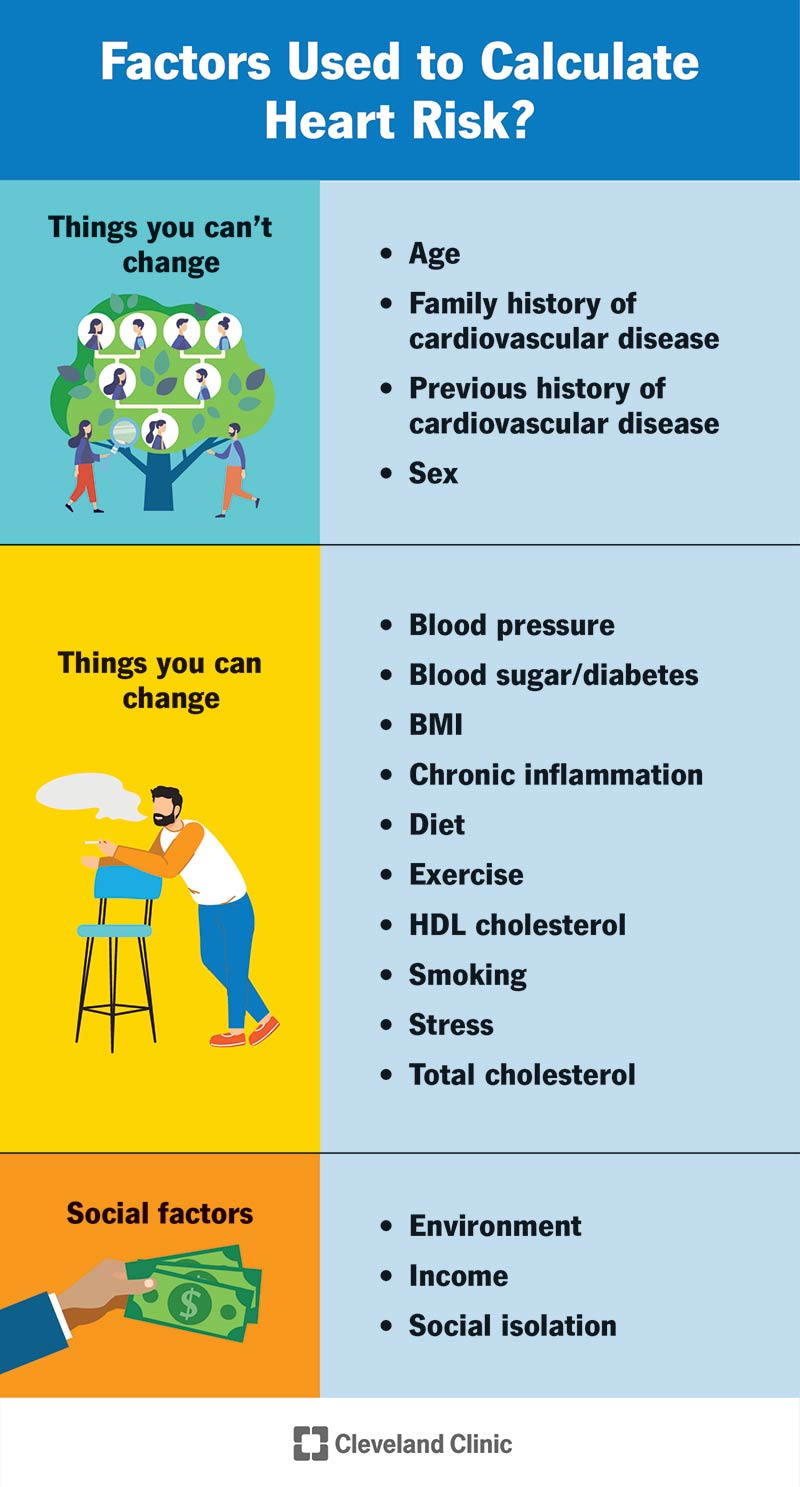You and your healthcare provider can use cardiac risk calculators to gauge how likely you are to develop heart disease. These cardiovascular risk assessments use personal health information to calculate a 10-year and lifelong risk of heart disease. The risk score can help you make lifestyle changes or take medicines to prevent heart disease.
Advertisement
Cleveland Clinic is a non-profit academic medical center. Advertising on our site helps support our mission. We do not endorse non-Cleveland Clinic products or services. Policy

Image content: This image is available to view online.
View image online (https://my.clevelandclinic.org/-/scassets/Images/org/health/articles/17085-heart-risk-calculator)
A cardiac risk calculator is a screening tool. You and your healthcare provider can use it to determine your risk of future cardiovascular disease. The information can help you take steps to reduce your risk. Lifestyle changes or medications may help prevent life-threatening heart problems.
Advertisement
Cleveland Clinic is a non-profit academic medical center. Advertising on our site helps support our mission. We do not endorse non-Cleveland Clinic products or services. Policy
A cardiac risk calculator uses your personal health information to gauge your future risk of cardiovascular disease (heart disease). It can help determine the likelihood of:
Your healthcare provider uses results from cardiac risk calculators to:
Cardiac risk calculators are only helpful if you haven’t already had a heart event. The information isn’t useful if you’ve had a heart attack, stroke or heart failure.
There are different methods to assess heart disease risk factors. In general, a heart disease risk assessment may consider your:
Advertisement
Different online calculators and smartphone apps perform cardiovascular risk assessments. You may also complete an assessment at your healthcare provider’s office. Each tool may ask for slightly different information. But there shouldn’t be much (if any) difference in the results.
Here’s a look at some reputable cardiac risk calculators that you and your healthcare provider may use:
Healthcare providers use the American College of Cardiology (ACC) Atherosclerotic Cardiovascular Disease (ASCVD) Risk Calculator. It’s also called the ASCVD Risk Estimator Plus. This tool assesses the chances of a person ages 40 to 79 developing heart disease over the next 10 years.
Atherosclerotic refers to hardening or narrowing of the arteries. This problem contributes to heart disease. The tool can also estimate the lifetime heart disease risk for people ages 20 to 59.
The ACC collaborated with the American Heart Association (AHA) to develop this reliable heart risk calculator. The online AHA Cardiovascular (CV) Risk Calculator is a modified ASCVD Risk Calculator that asks fewer questions. Still, your results should be nearly identical.
Providers also use the ASCVD Risk Calculator to see how certain treatments might improve your risk status. For instance, taking a statin to lower high cholesterol may reduce your risk from intermediate to borderline or low risk. This improvement is called therapy impact. Both the AHA and ACC heart risk calculators suggest actions you can take to improve your risk score.
The ASCVD Risk Calculator can also show how one or more of these steps can prevent heart disease:
The Reynolds Risk Score evaluates heart disease risk for people who don’t have diabetes. This tool excludes people with diabetes because they already have a higher likelihood of heart disease and strokes.
The Reynolds Risk Score uses information about your age, sex, blood pressure and cholesterol levels. It also takes into account whether your mother or father had a heart attack before age 60. This information can indicate a genetic risk for heart problems.
The calculator also factors in your high-sensitivity C-reactive protein (hsCRP) level. Your provider may request this information as part of a blood test to determine risk of coronary artery disease.
Cardiac risk calculators give a heart disease risk score as a percentage. The lower the percentage, the lower your chances of developing heart disease in the next 10 years. The higher the percentage, the greater your chances of significant heart problems now and in the future. The ASCVD Risk Calculator also predicts your lifetime risk of a heart problem.
Advertisement
To determine your score, the tool compares your information to patient data from earlier heart disease clinical studies.
Many heart risk calculators classify your risk of cardiovascular disease as:
Depending on your cardiovascular risk assessment score and your symptoms (if any), your healthcare provider may order additional tests, such as:
You can take these steps to lower your chances of heart disease:
A cardiac risk calculator (cardiovascular risk assessment) evaluates your unique information to gauge your future risk of heart disease. You and your healthcare provider can use this information to take steps to reduce your risk. The ASCVD Risk Calculator assesses heart disease risk. It also shows the impact specific therapies can have on decreasing this risk. You can take a heart risk assessment online, via a smartphone app or at your provider’s office. Be sure to share at-home cardiac risk assessment information with your provider so you can discuss ways to protect your heart health.
Advertisement
Advertisement

Sign up for our Health Essentials emails for expert guidance on nutrition, fitness, sleep, skin care and more.
Learn more about the Health Library and our editorial process.
Cleveland Clinic’s health articles are based on evidence-backed information and review by medical professionals to ensure accuracy, reliability and up-to-date clinical standards.
Cleveland Clinic’s health articles are based on evidence-backed information and review by medical professionals to ensure accuracy, reliability and up-to-date clinical standards.
When your heart needs some help, the cardiology experts at Cleveland Clinic are here for you. We diagnose and treat the full spectrum of cardiovascular diseases.
